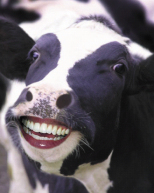How Belching Cows Contribute to Global Warming
 Earth Day was April 22nd and the L.A. Times featured a front page article with a diagram showing how nearly a third of greenhouse gas emissions linked to global warming derive from the ingredients and energy to produce food. And the U.N. reports that livestock contributes towards 18% of global greenhouse gas emissions.
Earth Day was April 22nd and the L.A. Times featured a front page article with a diagram showing how nearly a third of greenhouse gas emissions linked to global warming derive from the ingredients and energy to produce food. And the U.N. reports that livestock contributes towards 18% of global greenhouse gas emissions.
Those poor belching cows. An average cow burps up 145 pounds of methane per year. Methane has 23 times the warming potential of Carbon Dioxide (CO2). So effectively cows let loose 3,330 lbs per year of CO2. That equates to over 3000 miles driven in a car that gets 20 miles per gallon (check out the U.S. Environment Protection Agency Personal Emissions Calculator by clicking here).
Let's break this down differently. Bringing a 6 oz. beef steak to your dinner plate generates 16 lbs of CO2 emissions. That equates to about 23 miles of driving at 20 MPG. So if you're gonna have a good steak, the least you could do is not drive too far for it! (On that note, check out Mastro's in Thousand Oaks.)
An even better alternative? Try chicken. A 6 oz chicken breast generates less than 2 lbs. of greenhouse gas to arrive at your dinner plate.
To learn how to eat in way that minimizes the impact on global warming, visit the Bon Appetit Management Company's online carbon calculator at www.EatLowCarbon.org.
Back to the hungry, gassy cows again. Cow manure generates both methane and nitrous oxide (a.k.a. "laughing gas") (now why is it I'm not laughing when I smell cow manure?). Nitrous oxide has 296 times the warming potential of CO2. So think about not only the meat you eat, but how you fertilize your garden.
Some final parting carbon-conscious tips that come from the L.A. Times article:
-
Reduce your beef and cheese consumption
-
Don't waste food as it ends up in a landfill producing methane
-
Compost fruit and veggie scraps
-
Buy locally grown food as much as possible
-
Eat lower on the food chain; producing crops for livestock adds to warming
-
Drink tap water rather than bottled; or if it must be bottled, drink from local sources
Lastly, if you have to belch, watch out. Someone may be counting your carbon equivalents.